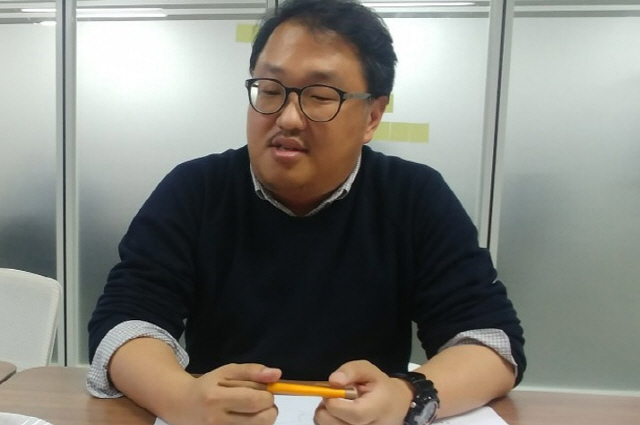
“Jeju Island will become a ‘regulatory sandbox’-type special zone. We will develop and expand blockchain service models while trying to promote industries, nurture the work force and connect investors through proper regulations.”
Noh Hee-seop, director of the Future Strategy Bureau at Jeju Special Self-Governing Province, made the remarks in an interview with Decenter Wednesday while explaining about the province’s plan to “make citizens feel blockchain services.”
Blockchain services Jeju Island envisions as a prospective blockchain special zone include verifying identifications of residents; refunding duty-free goods; boosting traceability of electric vehicles’ scrap batteries; promoting real estate transactions; calculating sharing economy monies; and refunding carbon dioxide reductions.
Touching on the identification service using blockchain, Noh cautioned, “Some people have been receiving benefits unduly although they are not Jeju residents, taking advantage of difficulties in accessing personal information.” He said the blockchain identification service could solve the problem, adding that if this service is applied to voting, it would be possible to cut about 12 billion won needed to let 600,000 Jeju inhabitants cast votes.
Noh said a blockchain-based refunding service for duty-free items will be introduced to duty-free shops on Jeju Island by the end of June next year, emphasizing that the southern resort island is loved by many foreigners. As the service has the smart contract system, foreigners can get refund for duty-free goods at once on the spot.
Blockchain technology also can be used in tracking down on scrap batteries of electric vehicles. “Electric car batteries are main recycling resources. Considering that 30% of electric vehicles sold domestically are distributed on Jeju Island, boosting the battery traceability is essential to more effective recycling,” Noh explained.
Real estate is one of the services Noh counts on much. He says blockchain will make it possible to ensure confidence in mortgage loan documents and simplify procedures. “It’s possible to secure confidence clearly although banks don’t take additional measures.” Jeju Island is discussing concrete ways to implement these services with relevant companies. In fact, the Jeju municipal government has reflected 170 million won for “research into the creation of Juju as the global blockchain hub” in next year’s budget.
Jeju Island’s “blockchain special zone blueprint” encompasses all these contents in what appears to be a move to become the first mover to foster the blockchain industry. “New industrial policies are necessary to accommodate blockchain technology,” said Noh, adding that “at a time when there is a strong need for a test location for proactive regulations, Jeju wishes to play the central role.”
Jeju Island plans to map out temporary business classifications and requirements related to cryptocurrencies and special financial provisions associated with cryptocurrencies by next month. The province is also responding to systems for growth special zones for regional innovation and the effectuation of special laws for regulations. Provincial officials are also preparing to apply for the designation of a special zone. Specifically, Jeju will file for the special zone beginning May next year if the relevant law goes into effect.
“We began to contact government agencies in August to request that Jeju Island be designated as a blockchain special zone,” he said. “We proposed that the Ministry of Trade, Industry and Energy and the Fourth Industrial Revolution Committee accept a pilot plan for special zone regulations and that the verified regulations on Jeju Island be expanded across the nation.” This is the province’s scheme to take the lead in laying the foundation for regulations because the central government has yet to unveil no other measures than the blanket ban on initial coin offerings (ICOs). “As the government banned ICOs domestically but allows distribution and transactions, there have been such evils as ICO scams. We hope to guarantee that businesses will perform blockchain businesses properly by suggesting clear-cut guidelines,” Noh said.
He said the creation of Jeju Special Self-Governing Province and the special law on Jeju international free city might be the answers to the problems. Article 1 of the special law stipulates that Jeju’s regional, historical and humanistic traits are honored, the de facto decentralization of power is ensured based on self-regulation, responsibility, creativity and diversity and the broad-based alleviation of administrative red tape and the application of international standards are guaranteed. “It will take at least 10 years before the blockchain legislation process is completed if it begins with discussions on allowing ICOs at the National Assembly,” said Noh, adding that even in Jeju Island where regulations are eased broadly under the special law, at least three years will be needed.
The municipal government’s special zone blueprint envisions implementing models for cryptocurrency standards and regulations and ensuring a base for attracting companies based on institutional differences. Its ultimate aim is to maximize blockchain effects by exploring and expanding blockchain services to be keenly felt by residents. “To help develop the technology market, policies for the promotion of science and technology must be separated from those for industrial promotion. We propose policies by which cryptocurrencies and blockchain can grow altogether focusing on industrial promotion,“ he said. /edshin@decenter.kr, yjk@decenter.kr
- 사동석 기자
- sahds@dcenter.kr







![샘 올트먼 월드코인, 각국 제동에도 확장세…부진 만회할까[코인 리포트]](https://newsimg.sedaily.com/2024/04/19/2D7Z2TLAAD_4_s.jpeg)

![테라·루나 폭락사태 2년…디파이 예치금 다시 120조 넘었다[블록체인 NOW]](https://newsimg.sedaily.com/2024/04/19/2D7Z2WIN7J_1_s.jpg)





![[점심브리핑] 바이낸스US, 前 뉴욕 연준 임원 합류](https://newsimg.sedaily.com/2024/04/17/2D7Y4EB722_1_s.png)







